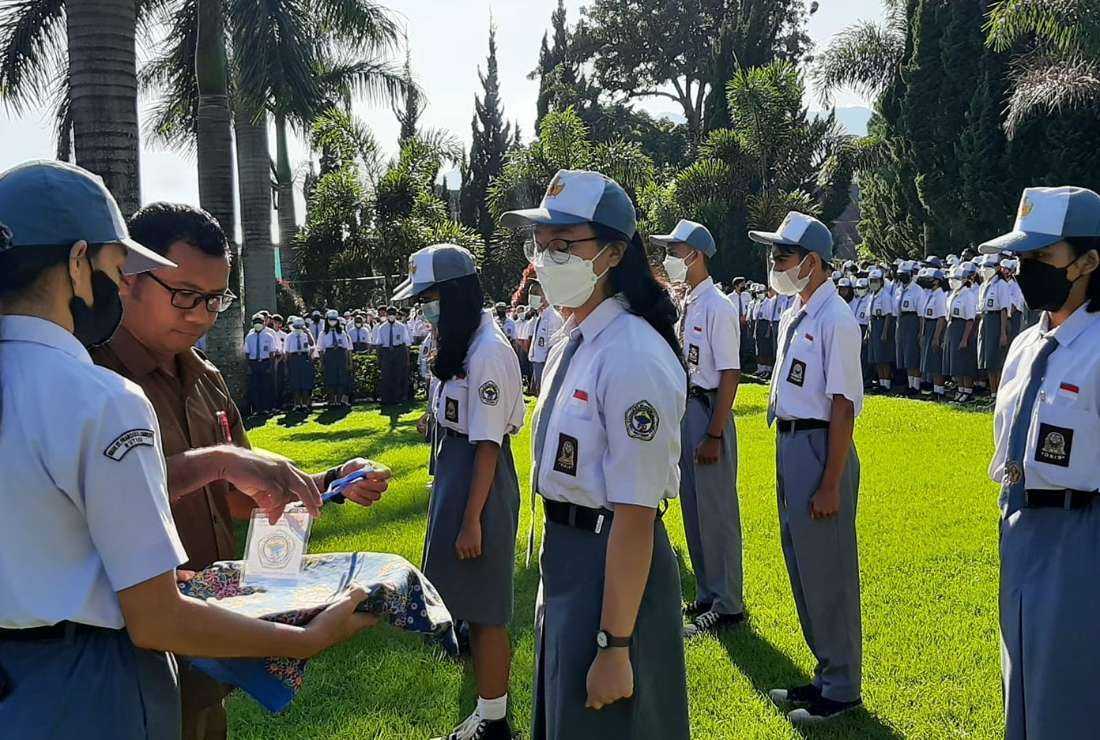
The election of a Muslim student leader in a Catholic school is seen as a rebuke against existing intolerance

Students are seen at St. Francis Xavier Senior High School in Ruteng of Indonesia. (Photo supplied)
Aprilia Inka Prasasti made history when she became the first Muslim to be elected chairperson of the Intra-School Student Organization (OSIS) at St. Francis Xavier Senior High School of Ruteng in Indonesia’s Catholic-majority Island of Flores.
Inka, 16, is one of only four Muslim students in the church-run school under the Ruteng Diocese founded in 1987. During the student election on Oct. 5, she defeated five candidates, all of them Catholics. She garnered support from students and teachers alike.
The school has 1,147 Catholic, 19 Protestant, 4 Muslim, and 3 Hindu students.
Achmad Nurcholish from the Indonesian Conference on Religion and Peace said the Catholic students who sincerely accepted the victory of a Muslim student had shown a mature attitude.
"This is a good example in the context of our diversity, to be able to live together with different brothers and sisters," he said.
Father Martin William, the school's principal, said Inka’s victory was a "rebuke" against the existing practice that "glorifies religion and overrides rationality" while choosing leaders.
He said his school fully supports any students who are elected, because the most important thing is "leadership capability, namely having good intellect and character."
Fransiska Widyawati, a lecturer at the Indonesian Catholic University of St. Paul in Ruteng, said Inka’s victory sent an important message to break away from the tendency to "look for one's own religious group."
However, in the education system, she said, "many students from minority groups are victims of bullying," which was a matter of concern.
Inka’s election has drawn widespread appreciation, but examples of discrimination against non-Muslim students in various public schools are common in Indonesia.
Discrimination against minority students
In August, the nationalist Indonesian Democratic Party of Struggle in Jakarta, which opened a hotline on acts of discrimination and intolerance in schools, reported at least 10 cases of intolerance in schools in Jakarta.
On Oct. 19, the deputy principal and three other teachers at Public Senior High School 52 in capital Jakarta reportedly blocked a non-Muslim student from running for an election to the student council.
In a recorded conversation with teachers, the deputy principal said "don't let non-Muslim students" be candidates.
A similar case also occurred at Public Senior High School 58 in Jakarta in August. A teacher shared a message via the school's WhatsApp group asking Muslim students to be careful while choosing the two non-Muslim candidates in the fray, "because we have to choose candidates who share our faith."
Last month, Christian students at a public school in Depok, West Java province were barred from using the school's rooms for faith-building activities, leading them to do so in the school hallways.
In 2020, in Depok city, Public Senior High School 6 decided to conduct a re-election after a non-Muslim student won the OSIS chair election, which led the non-Muslim student to resign, claiming it was a form of discrimination.
In the message to the colleagues, the student said, "let this be a lesson... in the future."
Some schools even force non-Muslim students to wear Muslim attire, such as the hijab, behave like Muslims, starting from greeting to reciting the prayers.
In 2021, a non-Muslim female student at Public Vocational School 2 2 Padang, West Sumatra province, was forced to change her school after a teacher allegedly asked her to wear a hijab.
Bonar Tigor Naipospos, deputy chairman of the Setara Institute for Democracy and Peace, said such cases are clear evidence of creeping intolerance in educational institutions.
"This is the result of conservative ideas that are continuously propagated by certain groups who believe school-age children to be an important factor in the future," he said.
These groups not only penetrate existing schools, both public and private, but even establish their own schools, Naipospos added.
Battling the rising wave
In 2020, the Ministry of Education, Culture, Research, and Technology termed intolerance as one of the three major problem areas in educational institutions, besides sexual violence and bullying.
The stance warrants the government to take strong action against cases of intolerance. In proven cases of intolerance, the local Education Office imposes sanctions on teachers and principals in public schools.
Naipospos said, in addition to such measures, what needs to be done in the school is to teach students to reason, and question ideas that are not compatible with diversity.
"Education on Pancasila (state’s secular ideology) in classrooms should not only be memorized but complemented by critical discussion and praxis," he said.
Meanwhile, Father William said even though Catholics are the majority at the St. Francis Xavier Senior High School in Ruteng, they provide opportunities for students of other religions to lead prayers according to their beliefs every Monday.
On every Friday, he said, teaching and learning activities end at 12 pm to allow Muslim students the opportunity to worship.
This can ward off the seeds of radicalism and intolerance, the priest believes.
Inka appreciated that the school’s open environment gives her confidence.
"The open attitude of the school community makes me feel comfortable and confident," she said. "Essentially all religions are the same, that is, they teach the goodness of life," she said.
Help us keep UCA News independent
The Church in Asia needs objective and independent journalism to speak the truth about the Church and the state.
With a network of professionally qualified journalists and editors across Asia, UCA News is just about meeting that need. But professionalism does not come cheap. We depend on you, our readers, to help maintain our independence and seek that truth.
A small donation of US$2 a month would make a big difference in our quest to achieve our goal.

Share your comments